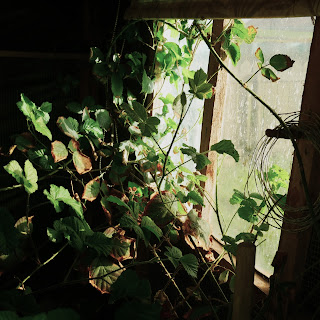Everywhere you look
you're reminded of the passage of time. Everything from the way the
pebbles that make up the shingle have worn smooth and the evolution
of the plants that grow among them (the sea cabbage especially) to
the sheds people have built, then abandoned. One, on a rise just
behind the shingle, barely hangs together, its rotten planks burst
apart by the wind exposing tea, salt and pepper still sat on a shelf,
a rusty bicycle. Another, its door come away, is full to what is left
of its rafters with brambles, the leaves pressing their eager faces
up against the window.
There are few buildings. Most of those
there are are strung out along the top of the rise behind the
shingle. A few yards inland, there is a small cluster of bungalows,
built in what once must've been a 'cheap and cheerful' style but
which now haunt us with visions of a world for which we can find no
modern equivalent. Mod cons – principally, the internet – have
had to be grafted on.
There is a road down to the sea that
ends in a car park. People come here to walk their dogs, entertain
their children or just sit and look. The tracks down to the shingle
are lined with pebbles people have painted and left there. This is a
pebble painter's paradise.
Sometimes, from here,
you can see the Isle of Man on the horizon. When you can, it's a
mirage: if the conditions are just right, the atmosphere refracts the
light, making the distant island (which lies way beyond the visible
horizon) appear surprisingly close. You can see its principal hills
spread out from left to right. I've never caught it in the act of
appearing or vanishing, though, although, the other evening,
conditions were such that you could only see the tops of its hills
poking above the milky obscurity. One can see how myths arose of
magic islands that appear and vanish and, scanning the horizon to see
if you can see Man from Silecroft, it's easy to start doubting the
science that tells you that what you're witnessing is no more than an
atmospheric effect.
Thursday, 25 May 2023
Silecroft
Thursday, 23 June 2022
Of Lighthouses and Lagoons
We recently returned from a holiday in Cumbria. We stayed for a week on a caravan site in Haverigg. The site's situated on the edge of a lagoon on the far side of which stands a lighthouse. The lagoon was once a vast industrial site - an iron-ore mine - which has since been flooded and turned into a nature reserve. Literary associations kept popping into my head all week: every time I looked out of the window and saw the lighthouse I found myself thinking of Virginia Woolf's To the Lighthouse and of Mr Ramsay telling his son that the weather wouldn't be fine.
Fortunately, it was fine. I didn't have to resort to cutting out pictures from the Army and Navy Stores catalogue to while away the time. And then, looking at the surface of the water, which stretched away to the lighthouse from just outside the door of the caravan, I couldn't help wondering what lay beneath it. It would be interesting, I thought, to lower an underwater camera into the water, to explore the landscape of the lagoon-bed see what remained of its industrial past. I was reminded of JG Ballard's The Drowned World - another book I very much enjoyed reading. I had a silly thought, too, that this was the way Mordor might look, fifty years after the defeat of the Dark Lord, the pits of the orcs landscaped, filled with water and turned into bird sanctuaries and suchlike.
Among the Trees
I went for a walk the other evening which took me to the edge of my late stepfather David's old farm, to the plantation which we always ...

-
I went for a walk the other evening which took me to the edge of my late stepfather David's old farm, to the plantation which we always ...
-
This week's International Times is a Fluxus special bumper issue. For anyone reading this who doesn't know, Fluxus was an interdisci...
-
There's still snow on the ground. For once, I'm not worried how I'm going to get around. I've nowhere to go. I said in an ea...








